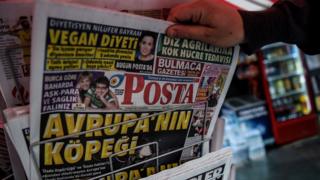 Image copyright
Image copyright
AFP/Getty Images
One Turkish newspaper referred to the Dutch on Monday as the “dogs of Europe”.
The Netherlands has warned its citizens over travel to Turkey as a row between the countries shows no sign of abating.
Germany, Austria and the Netherlands blocked Turkish attempts to hold rallies in those countries.
Turkish President Recep Tayyip Erdogan vowed retaliation, accusing them of “Nazism”.
On Monday, the Dutch foreign ministry issued a new travel warning, urging its citizens in Turkey to take care and noting the new “diplomatic tensions”.
The warning to “avoid gatherings and crowded places” came as Turkey’s foreign ministry lodged a formal protest with the Dutch envoy.
Meanwhile, the Dutch deputy prime minister, Lodewijk Asscher, said that “to be called Nazis by a regime which is walking backwards in regards to human rights is just disgusting”.
The BBC’s Mark Lowen, in Istanbul, said the two Nato allies were now locked in an “unprecedented diplomatic crisis”.
How did the row come about?
The proposed rallies aimed to encourage a large number of Turks living in Europe to vote Yes in a referendum on 16 April on expanding the president’s powers. The plans were criticised by senior EU officials on Monday.
In Germany, for example, there are more than three million people of Turkish origin, of whom an estimated 1.4m are eligible to vote in Turkish elections. In effect, the diaspora is Turkey’s fourth-largest electoral district.
Planned rallies in Germany, Austria and the Netherlands were blocked after officials cited security concerns or said the rallies could stoke tensions.
A gathering in France went ahead, however, after officials said it did not pose a threat.
Two Turkish ministers were barred from addressing rallies in the Dutch city of Rotterdam, with one of them escorted to the German border.
Police used dogs and water cannon against protesters waving Turkish flags in Rotterdam.
- Erdogan chases diaspora vote – but ties fray
- Reality Check: Is banning rallies EU policy?
- Erdogan rallies not welcome in Austria
How did Turkey respond?
Mr Erdogan likened the Netherlands to “a banana republic”, demanded international organisations impose sanctions on the Netherlands, and accused countries in the West of “Islamophobia”.
“I have said that I had thought that Nazism was over, but I was wrong. Nazism is alive in the West,” he added.
He warned that countries would “pay the price” for their actions.
On Monday morning, Turkey summoned the Dutch charge d’affaires in Ankara for the third time in three days. He was handed two notes, protesting against the treatment of the minister escorted to Germany, and the treatment of protesters in Rotterdam.
Image copyright
AP
Protests ignited outside the Dutch consulate in Istanbul on Sunday
And what was the response to Turkey?
Dutch PM Mark Rutte called Mr Erdogan’s comments “unacceptable”, and demanded an apology. The pressure from Turkey comes days before the Dutch election, in which Mr Rutte is facing pressure from anti-Islam candidate Geert Wilders.
Germany’s foreign minister said he hoped Turkey would “return to its senses”.
Chancellor Angela Merkel has said her government is not opposed to Turkish ministers attending rallies in Germany, as long as they are “duly announced”. At a news conference on Monday, she said the Nazi comparisons were “completely unacceptable” and that the Netherlands had her full support.
Danish Prime Minister Lars Lokke Rasmussen said he had postponed a meeting later this month with Turkish Prime Minister Binali Yildirim because “with the current Turkish attacks on Holland the meeting cannot be seen separated from that”.
He said he was concerned that “democratic principles are under great pressure” in Turkey.
Turkey-Netherlands row: Dutch warn citizens after Erdogan threat

